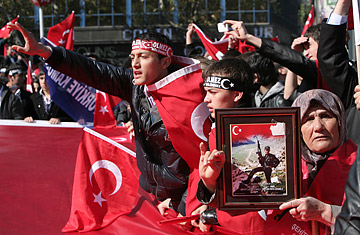
Yeter Eroglu holds a photograph of her son Murat Eroglu, 22, a Turkish soldier who was killed by Kurdish rebels, as she joins thousands of high school students and other citizens marching in the streets of Ankara, Turkey, on Oct. 20, 2011.
Reeling from the worst assault on its armed forces in almost two decades by the Kurdish separatist group PKK, Turkey has sent hundreds of troops into northern Iraq to take on PKK strongholds. Twenty-four Turkish soldiers were killed in coordinated attacks on border posts in Turkey's southeast in the early hours of Wednesday, Oct. 19, prompting Prime Minister Recep Tayyip Erdogan and members of his Cabinet to cancel trips abroad and gather in a briefing room in Ankara. TV stations have abandoned scheduled programming to broadcast coverage of the funerals of the slain soldiers — mostly young conscripts on a compulsory tour of duty — while thousands of high school students carrying Turkish flags marched through the streets of the capital.
Wednesday's activity cripples any immediate prospects for a political solution to Turkey's three-decade conflict with the PKK and will instead likely reinforce Erdogan's increasingly hawkish stand. The timing of the attacks appears to have been symbolic: they coincided with a long-anticipated meeting of lawmakers, including Kurdish MPs, to discuss a new constitution that could grant greater recognition to the country's estimated 20 million Kurds. "This is a declaration of war," wrote noted political commentator Mehmet Ali Birand. "There's no other way to explain it."
Besides adding to the turmoil within Turkey, the latest violence could have regional repercussions. The Arab Spring served as a reminder of how easily politics jumps national borders today, as they always have done for the Kurds — the world's largest stateless people, left straddling Syria, Iran, Iraq and Turkey by Anglo-French mapmakers in the wake of World War I. Only in northern Iraq do Kurds enjoy autonomy, and it is in the mountains on the Iraqi side of the Turkish border that the PKK is largely based.
Erdogan lashed out at unnamed foreign supporters of the PKK, alluding, commentators say, to Syria and Iran. The latest assault, Erdogan said, showed that "terror is a tool in the hands of certain powers. The PKK are subcontractors used by other forces and other powers, trying to provoke Turkish society." Relations with Syria have soured since Erdogan became vocally critical of his erstwhile friend Syrian President Bashar Assad. (During a previous period of Syrian-Turkish tensions, Damascus had allowed the PKK to operate out of Lebanon's Bekaa Valley, which was under Syrian control.) And although Iran has denied media reports that it recently detained and released a senior PKK commander, ties between Ankara and Tehran have cooled since Erdogan approved a NATO missile-defense shield to be placed in central Turkey to counter any Iranian threat.
"To understand the escalation of violence between Turkey and the PKK, you have to look at the bigger picture of regional dynamics, " says Radikal columnist Cengiz Candar. "The PKK is balancing on the Iran-Syria axis right now."
Another factor in the escalation is the scheduled U.S. withdrawal from Iraq later this year. Turkey last week concluded an agreement with Iraqi Kurdish officials to begin emptying PKK settlements there. It has also stepped up cross-border military operations. "Ankara might be wanting to take advantage of the U.S. withdrawal from Iraq to force the PKK out of its shelters in north Iraq, thereby squeezing it in a corner," says Sedat Ergin, a columnist for the Hurriyet daily. "The calculation would be to deal the group a serious blow and thus force it into a weaker position at the negotiating table."
Turkey spend the '90s trying to eradicate the PKK in a "dirty war" whose tactics included assassinations, forced evacuation of villages, torture and more. That episode ended with the capture of PKK leader Abdullah Ocalan in 1999 — he is currently in an isolated island prison, having been spared the noose only by European Union rejection of capital punishment — but its scars, for both Turks and Kurds, were never healed. Thousands of Kurds who migrated to the major cities of western Turkey suffer disproportionate poverty and marginalization. The PKK, despite its setbacks, was never dissolved. And Kurdish demands for greater cultural rights and autonomy increased. A renewed insurgency-counterinsurgency dynamic will further polarize Kurds and Turks, between whom tension has been rising.
"The PKK wants to push the limits of Turkish society and its decision makers. They want to provoke reaction and to kickstart a hellish scenario which involves full-on Turkish-Kurdish conflict," wrote Ergin in Hurriyet. When first elected in 2003, Erdogan appeared inclined to seek a political solution to the long-standing conflict. In 2005 he traveled to Diyarbakir, the capital city of Turkey's Kurds, and said the Kurdish problem was "everyone's problem." In line with E.U.-mandated reforms, he lifted a ban on Kurdish broadcasting and media. Recently it emerged that he also appointed a delegation to negotiate with Ocalan.
But Ankara's Kurdish outreach stalled. A group of Kurdish activists, including eight PKK fighters, who voluntarily turned themselves in at the Iraqi border in 2009 in preparation for a larger amnesty were harassed and arrested. Some 3,000 Kurdish politicians have been jailed in the past two years on charges of supporting the PKK, often in violation of due process. Erdogan and his colleagues frequently dismiss democratically elected Kurdish politicians, accusing them of being mouthpieces for the PKK. For its part, the PKK has increased attacks in recent months. As both sides become more hard-line, prospects for peace recede. This week's events have many fearing a return to the dark days of the early '90s.
